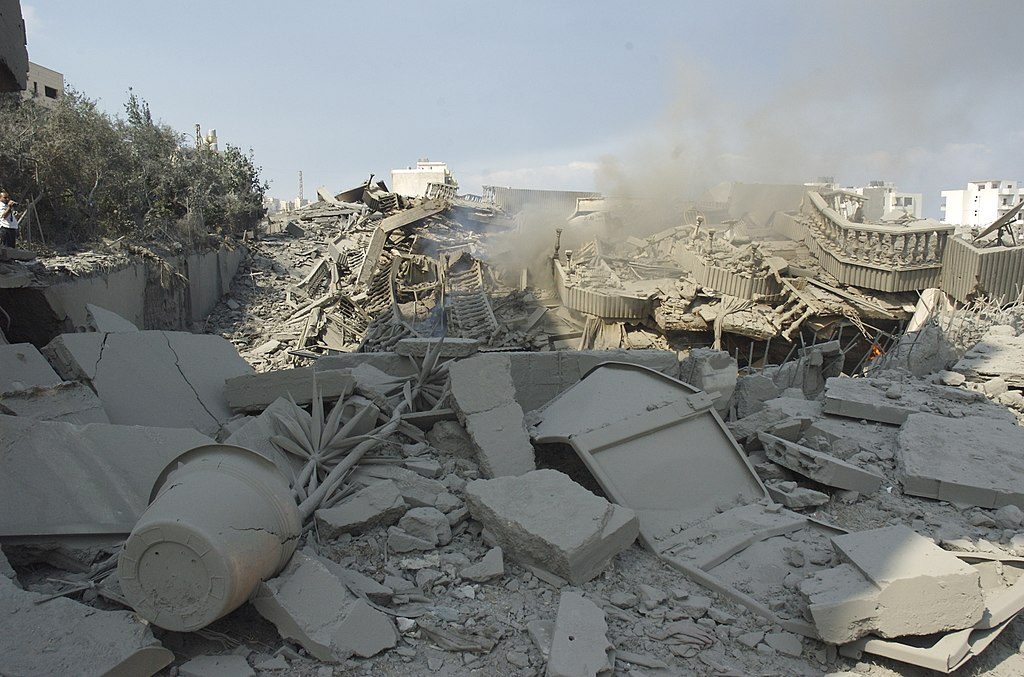Interview with Hassan Nasrallah’s daughter yields interesting insights; battle for new Israeli coalition government shifts gears

Copyright: Flickr user Koldo [CC BY-SA 2.0 (https://creativecommons.org/licenses/by-sa/2.0)]
With the touching and always bittersweet celebrations of Israel’s Remembrance and Independence Days over, it is now time to once again confront security and political realities. Zinab Nasrallah, the daughter of Hezbollah’s leader Hassan Nasrallah, sat down for a long interview with Lebanese TV in which she offered the usual assurances of Israeli destruction, its effacement from the map of the world and the eventual grand celebration of Muslims in the Al-Aqsa mosque on the Temple Mount in Jerusalem.
What was more interesting than the expected boilerplate propaganda in her interview, was her accidental admission to the trauma that the 2006 Second Lebanon War inflicted on her family. In 2006, Israel was rather uniquely led by a duo of non-IDF politicians: prime minister (Ehud Olmert) and defense minister (Amir Perez). Both were life-long politicos who advanced to the pinnacle of Israeli power through machinations and manipulations in the Knesset and in the labor union movement, respectively. To complete the picture, the Chief of General Staff, for the first and likely last time ever was a born and bred Air Force guy who advanced to that post from being the chief of that particular service, Lt. Gen. Dan Halutz.
This created a situation in which a left-leaning government, eager to avoid the appearance of weakness was advised by an IDF Chief of Staff who was a true believer in victory through air superiority alone and who was eager to prove his point. In their haste to retaliate against a Hezbollah border provocation, Israel launched the operation without proper preparation of its ground forces, resulting in a military stalemate that allowed Hezbollah to claim victory and receiving in exchange for agreeing to a cease fire a useless UN resolution forbidding the Hezbollah from rearming, a resolution everyone knew would not be kept even for 24 hours.
Supporters of the Olmert government, however, have long claimed that the massive air strikes that Israel carried out against the Hezbollah leadership in their Beirut enclave have served for over a decade and still serve today as a serious deterrent against Hezbollah adventurism. This claim is curiously and undoubtedly unintentionally supported by Zinab’s account of her life as a Hezbollah princess. This life seems to have two parts: before and after the 2006 war. Before was a happy and carefree time during which she and other members of her family lived normal lives, often spending quality time with the family patriarch warlord. After the war, this became impossible for fear of the “Zionist Regime” and she can now see her father only briefly once or twice a year. Zinab fondly remembers a musical mirror given to her by her father, a mirror that miraculously (and one feel perhaps uniquely) survived the Israeli onslaught.
While she claims that her father “does not live underground” and “has everything he needs”, her claims are belied by the fact that she does not elaborate as to his current whereabouts, which most likely change on a nightly basis. On the whole, her interview juxtaposes the baseless bravado of an inevitable future victory with the reality of a deep trauma, clearly bordering on PTSD, that the 2006 war inflicted on her family and presumably the families of other Hezbollah leaders. It would appear that a repeat of this experience is something they may want to avoid on a visceral level.
This coming Wednesday marks the end of regulation time for Netanyahu’s efforts to build a governing coalition. To date, not a single agreement has been signed between the Likud and any of its junior partners and it is beyond doubt that the coalition saga will enter into its customary two-week overtime, with no party wishing to be the first “sucker” to sign on before seeing what the other parties “got”. The final negotiations are not expected to conclude before a minute to midnight of the last possible day.
While the coalition makeup is known, surprises are not impossible. If the two camps, the secular (Israel Beitenu, Kulanu) and the religious (Torah Judaism, Shas) give Netanyahu too much trouble in forming his new, fifth, ruling coalition, he may use this impasse to court the head of the loosely cobbled together Blue and White party, Benny Gantz by offering him to split his Resiliency For Israel faction and take on the post of Defense Minister. While the vitriol between Gantz and Netanyahu during the election campaign was significant, it is easily dispelled by the growing threat from Gaza and the need to confront it with a national unity government. Already today, certain terror factions in Gaza stated that any fatality during the zombie-style attacks they stage every Friday on their internationally recognized border with Israel will be answered by rocket fire on Israeli civilian population in Tel-Aviv. Of course, killing zombies is the only way to stop them so fatalities are inevitable, making this threat more than a real possibility.
A national unity government between the Likud and Gantz’s Resiliency for Israel party would postpone the battle royal between the religious and secularist parties on the Israeli center-right, something that Netanyahu would not have any objection too, but the religious parties, knowing that their voters expect them to deliver budgets and government jobs above anything else will do everything to prevent. Netanyahu has already worked closely with Gantz when the latter was IDF’s Chief of Staff and both men share a cautious and incrementalist approach to managing Israel’s security problems. In the final count, the decision will be in Gantz’s court: will he feel that the most assured path to the prime minister’s office lies in service as the defense minister in Netanyahu’s fifth government or in leading the opposition to the same? The next few weeks will provide the answer.


